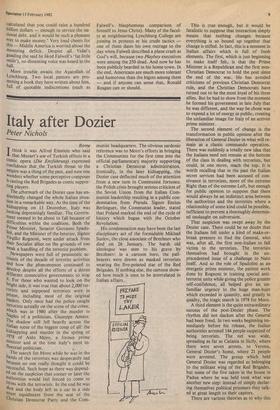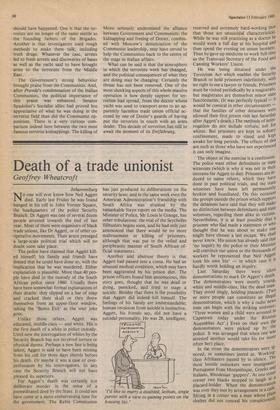Italy after Dozier
Peter Nichols
Ithink it was Alfred Einstein who said that Mozart's use of Turkish effects in a comic opera (Die Entfuhrung) expressed confidence that ,the Turkish threat to the empire was a thing of the past, and now one Wonders'whether some perceptive composer 1s casting the Red Brigades as comic suppor- ting players. The aftermath of the Dozier case has un- doubtedly changed the whole Italian situa- tion in a remarkable way. At the time of the kidnapping on 13 December, Italy was looking depressingly familiar. The Govern- ment seemed to be about to fall because of difficulties within the coalition. Both the Prime Minister, Senator Giovanni Spado- Ilm, and the Minister of the Interior, Signor Virgilio Rognoni, were under attack from their Socialist allies on the grounds of too weak a handling of the terrorist problem. Newspapers were full of pessimistic ac- counts of the decade of terrorist activities and how the phenomenon continued to develop despite all the efforts of a dozen different consecutive governments to stop it.. For those who wanted to look on the bright side, it was true that about 2,000 ter- rorists and supposed terrorists were in Prison, including most of the original leaders. Only once had the police caught terrorists actually on the scene of the crime, Which was in 1980 after the murder in Naples of a politician, Giuseppe Amato. The shadow still fell heavily across the Italian scene of the biggest coup of all: the kidnapping and murder in the spring of 1978 of Aldo Moro, a former prime Minister and at the time Italy's most in- fluential politician. # The search for Moro while he was in the bands of the terrorists was desperately sad because no one really thought it could be successful. Such hope as there was depend- ed on the suspicion that sooner or later the authorities would feel forced to come to terms with the terrorists. In the end he was shot and the body left in a car in a side street equidistant from the seat of the Christian Democrat Party and the Com- munist headquarters. The obvious sardonic reference was to Moro's efforts in bringing the Communists for the first time into the official parliamentary majority supporting a Christian Democrat administration. Ironically, in the later kidnapping, the Dozier case deflected much of the attention from a new turn in Communist fortunes: the Polish crisis brought serious criticism of the Soviet Union from the Italian Com- munist leadership resulting in a public con- demnation from Pravda. Signor Enrico Berlinguer, the Communist leader, stated that Poland marked the end of the cycle of history which began with the October Revolution.
His condemnation may have been the last disciplinary act of the formidable Mikhail Suslov, the close associate of Brezhnev who died on 26 January. The harsh old ideologue was seen to his grave by Brezhnev: in a cartoon here, the pall- bearers were drawn as masked terrorists wearing the five-pointed star of the Red Brigades. If nothing else, the cartoon show- ed how much is seen to be interrelated in Italian affairs. This is true enough, but it would be fatalistic to suppose that interaction simply means that nothing changes because everything is so bound up together that change is stifled. In fact, this is a moment in Italian affairs which is full of fresh elements. The first, which is just beginning to make itself felt, is that the Prime Minister is a Republican and the first non- Christian Democrat to hold the post since the end of the war. He has avoided criticisms of previous Christian Democrat rule, and the Christian Democrats have turned out to be the most loyal of his three allies. But he had to show from the moment he formed his government in late July that he was different, and the way he chose was to expend a lot of energy in public, creating the unfamiliar image for Italy of an activist prime minister.
The second element of change is the transformation in public opinion after the liberation of General Dozier in what will re- main as a classic commando operation. There was suddenly a totally new idea that the Italians need not remain at the bottom of the class in dealing with terrorists, but could, in one move, reach the top. It is worth recalling that in the past the Italian secret services had been accused of con- nivance in terrorism, more of the extreme Right than of the extreme Left, but enough for public opinion to suppose that there would always be an indistinct area between the authorities and the terrorists where a relationship of some kind could be possible, sufficient to prevent a thoroughly determin- ed onslaught on subversion.
That suspicion was swept away by the Dozier case. There could be no doubt that the Italians felt under a kind of make-or- break pressure to find the General, who was, after all, the first non-Italian to fall victim to the terrorists. The terrorists themselves had brought in the un- precedented issue of a challenge to Nato itself. And so the role of Spadolini as an energetic prime minister, the patient work done by Rognoni in training special anti- terrorist units while giving the police greater self-confidence, all helped give an un- familiar urgency to the huge man-hunt which exceeded in quantity, and greatly in quality, the tragic search in 1978 for Moro.
A third element is the quite extraordinary success of the post-Dozier phase. The rhythm did not slacken after the General had been freed. In two weeks beginning im- mediately before his release, the Italian authorities arrested 144 people suspected of being terrorists. The net was wide, spreading as far as Catania in Sicily, where there were seven arrests, to Verona, General Dozier's home, where 21 people were arrested. The group which held General Dozier was regarded as belonging to the militant wing of the Red Brigades, but some of the five taken in the house in Padua where he was held took what was another new step: instead of simply declar- ing themselves political prisoners they talk- ed at great length to their captors.
There are various theories as to why this should have happened. One is that the ter- rorists are no longer of the same mettle as the founding fathers of the Brigades. Another is that investigators used rough methods to make them talk, including truth drugs. Whatever the case, arrests led to fresh arrests and discoveries of bases as well as the yacht said to have brought arms to the terrorists from the Middle East.
The Government's strong behaviour brought praise from the Communists. And, after Pravda's condemnation of the Italian Communists, the political importance of this praise was enhanced. Senator Spadolini's Socialist allies had proved less appreciative of what he was doing in the terrorist field than did the Communist op- position. There is a very curious com- parison indeed here between the two most famous terrorist kidnappings. The killing of
Moro seriously undermined the alliance between Government and Communists: the kidnapping and freeing of Dozier, combin- ed with Moscow's denunciation of the Communist leadership, may have served to help the Communists back to the centre of the stage in Italian affairs.
What can be said is that the atmosphere in which the terrorists work has changed, and the political consequences of what they are doing may be changing. Certainly the threat has not been removed. One of the most shocking aspects of this whole massive operation is how deeply support for ter- rorism had spread, from the doctor whose yacht was used to transport arms to an ap- parently harmless trade union official ac- cused by one of Dozier's guards of having put the terrorists in touch with an arms dealer. This decade of terrorism has still to await the moment of its Entfiihrung.











































 Previous page
Previous page